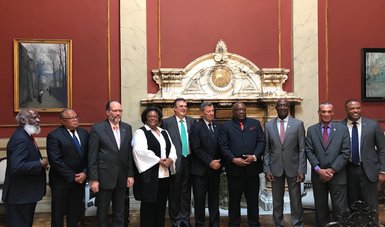The governments of Mexico, Uruguay and the countries of the Caribbean Community (CARICOM), in response to the call of UN Secretary-General António Guterres, agree that the only way to address the complex situation in Venezuela is through dialogue. This dialogue must lead to a negotiation based on respect for international law and human rights. The historical stance of our countries is and always will be to opt for diplomacy over all other alternatives, for that is the only way to achieve sustainable, legitimate and effective peace and stability.
Therefore, we propose the Montevideo Mechanism, driven by our legitimate interest and willingness to help the Venezuelan people and the actors involved to find a solution to their differences. The initiative is offered to the Venezuelan actors as a peaceful and democratic alternative that prioritizes dialogue and the peaceful resolution of conflicts with the aim of creating the conditions needed for an inclusive, comprehensive and lasting solution.
The Mechanism is evidence of an active, purposeful and conciliatory diplomacy aimed at bringing the disputing parties closer together. It is guided by the principles of non-intervention, legal equality of States, peaceful settlement of controversies, respect for human rights, and the self-determination of peoples.
Based on the experience of the signatory countries with mediation and the peaceful resolution of conflicts, we propose to establish a process that will take place in four stages over a reasonable period of time previously agreed by the parties:
Phase 1: Immediate Dialogue. Creation of the conditions for direct contact between the actors involved in a secure environment.
Phase 2: Negotiation. Strategic presentation of the results of the previous phase to the counterparts, seeking to find common ground and areas of opportunity for flexibility in their positions and conducive to potential agreements.
Phase 3: Commitments. Construction and signing of agreements based on the results of the negotiation phase, with the characteristics and timeframe previously agreed on.
Phase 4: Implementation: Achievement of the commitments made in the previous phase, with international accompaniment.
The signatories to this declaration agree that the degree of complexity of the circumstances should not be a reason to dismiss diplomacy as a means of dispute resolution. We reiterate our decision to help restore peace to the Venezuelan people through dialogue, in order to lessen the tensions between political forces and to avoid the threat or use of force.
In addition, our governments reiterate their concern for the serious humanitarian situation in Venezuela and respectfully call on all parties to ensure the human rights and freedoms established in the UN Charter signed by Venezuela.
This Mechanism is our proposal for ensuring a peaceful and democratic resolution that prevents the violence from escalating. In the event that the parties choose this path, we would invite individuals known for their international experience and moral character to accompany the Mechanism: Rebeca Grynspan, former Vice President of Costa Rica and current Ibero-American Secretary General; Enrique Iglesias and Bernardo Sepúlveda, former foreign ministers of Uruguay and Mexico, respectively; and Sir David Simmons, former Chief Justice of Barbados, as high representative of CARICOM.
